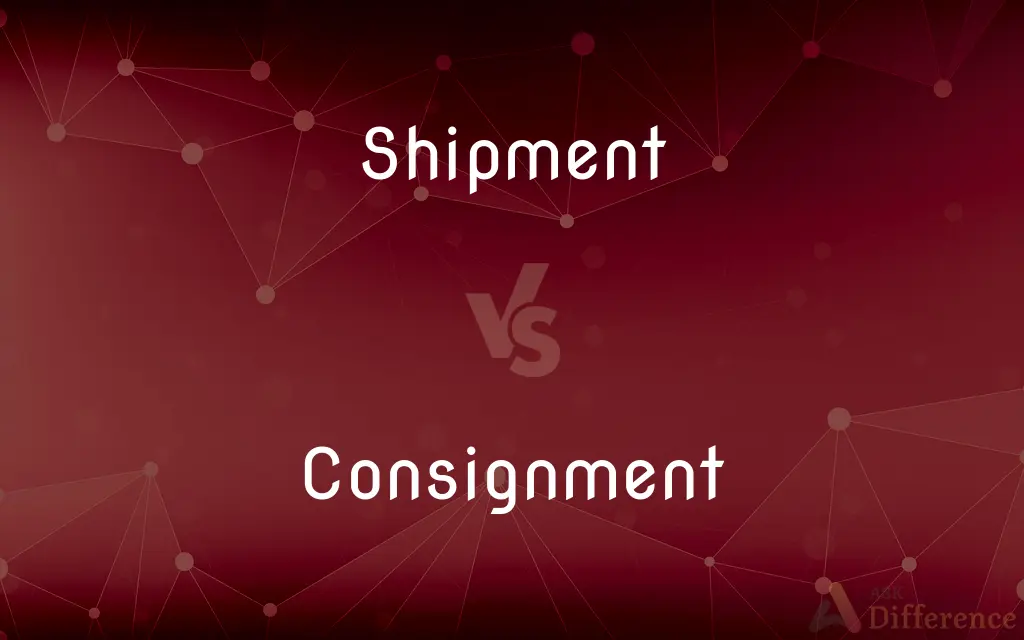Shipment vs. Consignment — What's the Difference?
By Tayyaba Rehman — Updated on September 18, 2023
A shipment refers to goods sent from one place to another. Consignment is a batch of goods sent to an agent for sale or distribution, often without immediate payment. Both involve transporting goods, but differ in terms of ownership and payment terms.

Difference Between Shipment and Consignment
Table of Contents
ADVERTISEMENT
Key Differences
Shipment typically denotes a batch of goods that are transported, irrespective of the purpose. Whether for sale, gifting, or other reasons, it simply means moving goods from one location to another. Consignment, on the other hand, specifically refers to goods sent by a consignor to an agent or retailer for sale, where the ownership remains with the consignor until sold.
When it comes to shipment, the focus is on the act of transporting goods, and once delivered, the transaction often ends. The primary concern might be safe and timely delivery. In contrast, with consignment, the transportation is just a part of the transaction. The main objective is the eventual sale of the goods by a third party.
From a financial perspective, shipment generally requires payment to be made before or upon delivery. Consignment is distinct in this aspect, as payment is typically made only after the goods are sold by the agent or retailer.
In terms of risk, the responsibility during a shipment usually transfers with the ownership of the goods. However, for goods on consignment, the consignor often retains much of the risk until the items are sold, especially if the agreement dictates that unsold items are returned.
A shipment can be a one-off event or a routine process, depending on the needs of the sender. Consignment often implies a longer-term relationship between the consignor and the agent, as they collaborate to sell goods over time.
ADVERTISEMENT
Comparison Chart
Definition
Goods transported from one place to another.
Goods sent to an agent for sale, with ownership retained until sold.
Focus
Transportation of goods.
Sale of goods by a third party.
Payment
Usually made before or upon delivery.
Made after the goods are sold.
Risk and Responsibility
Transfers with ownership.
Retained by consignor until items are sold.
Nature
Can be a one-off event or routine.
Often implies a long-term relationship between consignor and agent.
Compare with Definitions
Shipment
Goods transported from one location to another.
The shipment of electronics arrived on time.
Consignment
Goods sent to an agent for sale, retaining ownership until sold.
The boutique received a consignment of designer dresses.
Shipment
The act or process of shipping goods.
The shipment process was smooth and efficient.
Consignment
The act of consigning or sending goods to another for sale.
Consignment shops are popular for selling second-hand items.
Shipment
The dispatch of goods for transport.
The company is preparing for the next shipment.
Consignment
A batch of goods sent for sale or distribution.
The artist sent a consignment of paintings to the gallery.
Shipment
Goods dispatched for delivery.
The shipment has been delayed due to bad weather.
Consignment
Consignment involves selling one's personal goods (clothing, furniture, etc.) through a third-party vendor such as a consignment store or online thrift store. The owner of the goods pays the third-party a portion of the sale for facilitating the sale.
Shipment
A specific batch of goods sent together.
This shipment contains perishable items.
Consignment
A batch of goods destined for or delivered to someone
A consignment of drugs
Shipment
The action of shipping goods
Logs waiting for shipment
Consignment
The act of consigning.
Shipment
The act or an instance of shipping goods.
Consignment
Something consigned.
Shipment
A quantity of goods or cargo that are shipped together.
Consignment
A collection of goods to be sent, in transit or having been sent.
Shipment
A load of goods that is transported by any method (not just by ship)
We're expecting another shipment of oranges tomorrow.
Consignment
The act of consigning.
Shipment
The act of transporting goods
Shipment of hazardous waste on this route is strictly prohibited.
Consignment
The sale of one's own goods (clothing, furniture, etc.) through a third-party vendor, in exchange for a portion of the sale price, and with the consigner retaining ownership of the goods until they are sold or abandoned.
Shipment
The act or process of shipping; as, he was engaged in the shipment of coal for London; an active shipment of wheat from the West.
Consignment
The act of consigning; consignation.
Shipment
That which is shipped.
The question is, whether the share of M. in the shipment is exempted from condemnation by reason of his neutral domicle.
Consignment
The act of consigning or sending property to an agent or correspondent in another place, as for care, sale, etc.
Shipment
Goods carried by a large vehicle
Consignment
That which is consigned; the goods or commodities sent or addressed to a consignee at one time or by one conveyance.
To increase your consignments of this valuable branch of national commerce.
Shipment
The act of sending off something
Consignment
The writing by which anything is consigned.
Consignment
Goods carried by a large vehicle
Consignment
The official act of consigning a person to confinement (as in a prison or mental hospital)
Consignment
The delivery of goods for sale or disposal
Consignment
A shipment of goods for sale where payment is deferred.
The retailer accepts goods on consignment to boost inventory.
Consignment
Sending products to a third-party retailer for subsequent sale.
Many authors use consignment to place their books in local stores.
Common Curiosities
Is the Shipment cost included in the product's price?
Shipment costs may or may not be included in the product's price, depending on the seller's policy.
What does Shipment mean in logistics?
Shipment refers to the process or act of transporting goods from one location to another.
Can a Shipment include multiple items?
Yes, a Shipment can consist of multiple items bundled and sent together.
How is payment handled for Consignment goods?
Payment for Consignment goods is usually made after they are sold by the retailer.
How does Consignment work in retail?
Consignment involves sending goods to a retailer, who sells them and pays the supplier only when the items are sold.
Are all goods in a Consignment shop on Consignment?
Typically, yes. Consignment shops primarily stock items on Consignment, though there might be exceptions.
Are goods on Consignment owned by the retailer?
No, goods on Consignment remain the property of the supplier until they are sold.
Is there a size limit to a Shipment?
No, Shipments can range from small parcels to large freight consignments.
Are Shipments insured?
Shipments can be insured, but it depends on the shipping policy and the carrier.
What's the primary purpose of a Shipment?
The primary purpose of a Shipment is the transportation of goods.
Who bears the risk for unsold Consignment goods?
Typically, the consignor bears the risk for unsold Consignment goods unless otherwise agreed.
Can you track a Shipment?
Yes, many shipments can be tracked, especially if they are sent via modern courier services.
What happens to unsold goods in Consignment?
Unsold Consignment goods might be returned to the consignor or sometimes discounted, based on the agreement.
Can you expedite a Shipment?
Yes, many carriers offer options to expedite Shipments for faster delivery.
Who determines the price of items on Consignment?
The price of Consignment items is often agreed upon by both the consignor and the retailer.
Share Your Discovery

Previous Comparison
Consistence vs. Consistency
Next Comparison
Saccharin vs. SaccharineAuthor Spotlight
Written by
Tayyaba RehmanTayyaba Rehman is a distinguished writer, currently serving as a primary contributor to askdifference.com. As a researcher in semantics and etymology, Tayyaba's passion for the complexity of languages and their distinctions has found a perfect home on the platform. Tayyaba delves into the intricacies of language, distinguishing between commonly confused words and phrases, thereby providing clarity for readers worldwide.














































